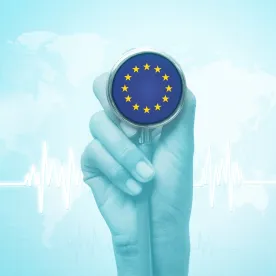Newly issued EU Regulation 2019/933 provides supplementary protection certificate exemptions for exporting and stockpiling active pharmaceutical ingredients and medicinal products if certain anti-abuse requirements are met.
In Depth
On 1 July 2019, EU Regulation 2019/933 entered into force. The Regulation introduced manufacturing waivers for exporting and stockpiling active pharmaceutical ingredients and medicinal products. If certain requirements are met, those actions are now exempted from supplementary protection certificate (SPC) protection.
Background
A European SPC is the equivalent to the US patent term extension for medicinal products, except that the SPC is a separate protective right which becomes effective upon expiry of a basic patent for an active pharmaceutical ingredient or medicinal product. SPCs were introduced to compensate pharmaceutical companies for the shorter effective patent protection resulting from the time elapsed between filing a patent application and obtaining market authorisation for a medicinal product. To incentivise pharmaceutical research, SPCs confer an additional period of protection of up to five years (five-and-a-half years in case of a further paediatric extension) after a basic patent has expired. Until the new EU Regulation entered into force, SPCs essentially granted the same protection as patents. In particular, manufacturing and sales of the protected product were prohibited prior to SPC expiry.
On 11 June 2019, EU Regulation 2019/933 regarding the SPC for medicinal products was published in the Official Journal of the European Union. Effective as of 1 July 2019, the new Regulation amends EU Regulation 469/2009, which in turn regulates SPCs. The new law provides for a manufacturing waiver that exempts from infringement the manufacturing of generic medicinal products and biosimilars in the European Union prior to SPC expiry, provided that the manufacturing is done for purposes of either exporting the products to countries outside the European Union (third countries) or preparing a day-one market entry in the European Union.
SPCs were first introduced in the European Union in 1992. The protection conferred by SPCs had the consequence of preventing makers of generics and biosimilars established in the European Union from manufacturing generics and biosimilars in the European Union, even for the purpose of exporting to third countries in which protection did not exist or had expired, or for the purpose of selling in the European Union immediately after expiry of the SPC (day-one market entry).
The generics industry argued that this situation led to a significant competitive disadvantage for EU manufacturers in comparison to manufacturers based in third countries, and that there was a negative impact on the EU economy because generics manufacturers had to relocate resources to countries outside of the European Union. The generics industry therefore called for a manufacturing waiver that, in their view, would save thousands of jobs and further contribute to the EU economy. Opposing opinions claimed that these advantages were purely speculative and overestimated at best. Furthermore, originators argue that the increase of employment in the generics industry could be accompanied by a loss of jobs in the originator industry. Some commenters also raised concerns about a risk of abuse. For example, there were concerns that once exported, products might be re-imported into the European Union. Moreover, the products could be exported to markets where an equivalent patent protection was still in force.
The European Parliament and the Council of the European Union decided to heed the interests of the generics industry and created exemptions from SPC protection for manufacturing medicinal products for exporting and stockpiling purposes. However, the concerns raised regarding potential abuses of the new exemptions were heard, and preventive provisions were introduced.
The new Regulation introduced exemptions from infringement regarding SPCs only. There is no prejudice to other intellectual property rights such as patents. In particular, while the active pharmaceutical ingredient of a medicinal product may be protected as such by an SPC, a patent for a method to manufacture said ingredient may still be in force in parallel to the SPC. In such a case, the manufacturing waiver will apply to the SPC only, and not to the manufacturing method patent.
Details of the New Exemptions
The new Regulation provides for two exemptions from SPC protection that apply in consecutive steps:
- During the whole duration of SPC protection, the making of a protected active pharmaceutical ingredient or a medicinal product containing that ingredient will be exempted if it is done for purposes of exporting to third countries.
- No earlier than six months before the expiry of an SPC, the making of a protected active pharmaceutical ingredient or a medicinal product containing that ingredient will be exempted if it is done for purposes of stockpiling and preparing a market entry that shall occur in the European Union immediately after expiry of the SPC.
In order to prevent abuse of these exemptions, certain requirements must be met. The manufacturer must notify the SPC holder and the competent patent office of the respective EU country in which the manufacturing is to take place, no later than either (1) three months before the start of the manufacturing in that country, or (2) three months before the first related act, prior to that manufacturing, that would otherwise be prohibited by the protection conferred by a SPC, which-ever is earlier. The notification to the patent office must be made using a standard form predefined by the Regulation. The prior notification shall enable the SPC holder to verify whether the manufacturer has complied with the requirements of the Regulation, and to initiate legal proceedings for non-compliance where applicable.
The notification also helps the SPC holder to monitor the market for potentially infringing products. However, a notification only three months in advance could prove to be too short for an SPC holder to effectively obtain injunctive relief against any infringements. Courts in Germany have been known to grant preliminary injunctions in generics cases ex parte (without an oral hearing) and within days, but the same cannot be said about courts in all EU countries..
Originators are therefore well advised to monitor the market carefully, in order to seek legal protection where needed.
Another requirement of the new SPC manufacturing waiver is that active pharmaceutical ingredients, or medicinal products containing those ingredients, which are manufactured for exporting need to be labelled accordingly. The Regulation defines a respective “EU export” label. This logo must be affixed to the outer packaging of the product and, where feasible, to its immediate pack-aging. This requirement shall reduce the risk of such products being re-imported into EU countries.
The maker also must ensure, through appropriate and documented means, that any person with whom the maker has a contractual relationship and who performs acts for which an exemption applies is fully informed that those acts are exempted under the new Regulation; that certain requirements apply and must be fulfilled; and that the placing on the market, importing or re-importing of the active pharmaceutical ingredient, or the medicinal product containing that ingredient, in the European Union could infringe the respective SPC where, and for as long as, that SPC if in force and the new exemptions do not apply.
Finally, the new exemptions do not apply to any act or activity carried out for the import of active pharmaceutical ingredients or medicinal products into the European Union merely for the purpose of repackaging, re-exporting or storing.
Should the manufacturer not comply with its obligation to provide, for medicinal products to be ex-ported to third countries, the reference number of the marketing authorisation in each third country of export, as soon as that reference number is publicly available, this non-compliance will affect exports to the relevant third country only. Exports to that country will not benefit from the new exemption.
The transitional regime of the Regulation is structured as follows: The exemptions will apply to all SPCs that are applied for on or after 1 July 2019. The exemptions will also apply to SPCs that have been applied for before 1 July 2019 and that take effect on or after that date, but in these cases the exemptions will apply from 2 July 2022 only. In contrast, the exemptions will not apply at all to SPCs that took effect before 1 July 2019. Given this transitional regime, it may take some time before we see the new exemptions in action.




 />i
/>i

